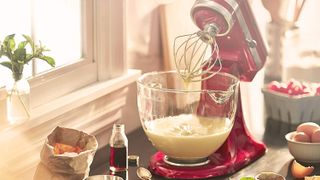The average KitchenAid mixer comes with a Flat Edge Beater, a Wire Whip, and a Dough Hook. These attachments are enough to complete most home baking recipes such as bread, cookies, cakes, meringues, pastry, and frosting, but the right attachment for your recipe can vary. Although most recipes (save the ones you get when you buy the KitchenAid itself, which are made especially for use with a KitchenAid mixer) do not indicate which attachments you should use, there are a few easy ways to work out which attachment you’ll need for each task. To find out, keep reading.
Which KitchenAid attachment to use: A general guide
The KitchenAid mixer manual is immensely helpful and contains countless brilliant recipes custom made for use in a stand mixer. You can check it out here (opens in new tab) to find a specific recipe, or you can check out our table below to find out our general guidance
How to know which KitchenAid attachment to use
The right cooking technique for your particular recipe should be made clear from the instructions. For example, a cake or cookie recipe may call for you to beat your mixture. This means to integrate your ingredients without the need to add air to your batter and, surprise surprise, whenever your recipe calls for you to beat your mixture, you’ll need the flat edge beater. Makes sense, right? First beating and now whipping, this baking thing is sounding a little aggressive. Things are slightly more complicated for the wire whip because very few recipes will tell you to whip your ingredients. What it will likely say is to whisk, which is considerably less nasty-sounding. Whisking egg whites and cream can allow you to incorporate air into ingredients, which will transform your whites to meringues and your cream into, well, whipped cream. See where the name comes from now? That’s not all you can do with your wire whip though, you can also use this mixer with finer mixes such as pancake batters and fillings for quiches. If your recipe calls for you to whisk something, it’s time to use your wire whip. Finally, the dough hook. The clue is also in the name with this one, but the dough hook won’t work with all types of doughs. One example is cookie dough. Although this is technically a dough, you don’t need to knead it, which is what this attachment is designed to do. For cookies, a flat edge beater is the suitable KitchenAid mixer attachment. For breads though, a dough hook can save you some serious kneading by being used on a low setting (one or two is best) to work your dough and add elasticity, while allowing yeast to develop.
Additional KitchenAid attachments: What to use, and when
We’ve covered the flat edge beater, wire whip, and dough hook so far, but what about the other KitchenAid attachments on offer? Well, you can infer far more easily which attachments to use for certain tasks when it comes to pasta rollers, food grinders, and spiralizers, but that doesn’t mean these are single-use attachments. For example, the food grinder attachment is great for more than just meat for homemade burgers or lasagne. You could also try your hand at making mashed potatoes in a food grinder. Simply place cooked potatoes in your grinder and it should act as a ricer, which is one of the best appliances used by chefs to create lump-free and finely mashed potatoes.
